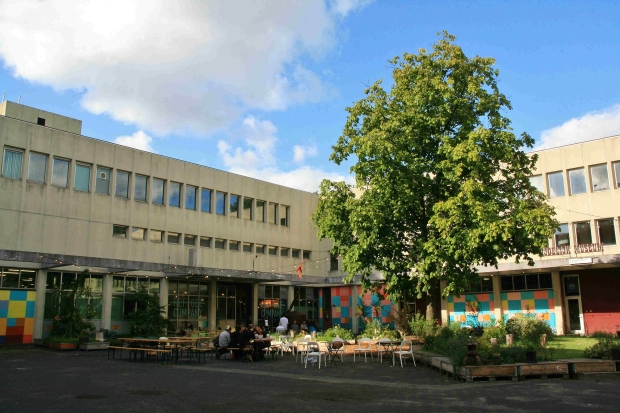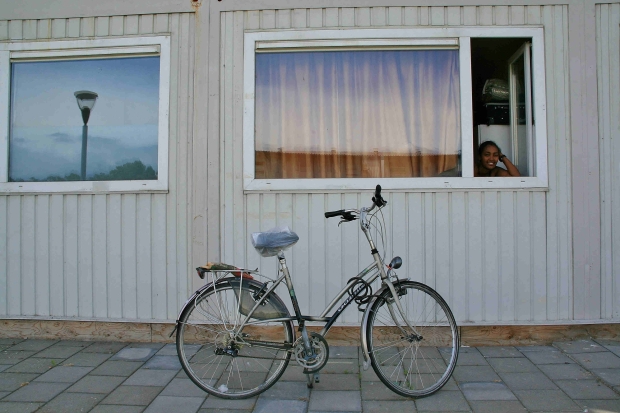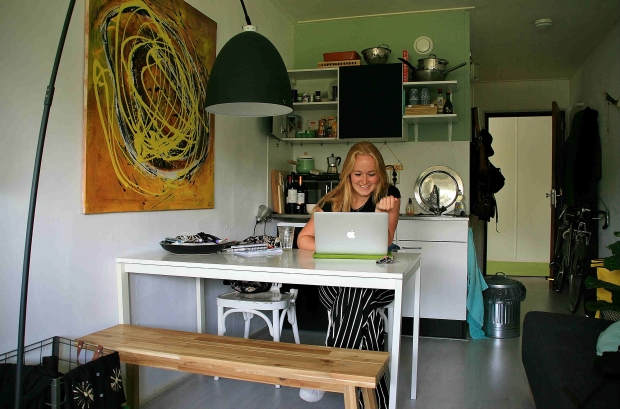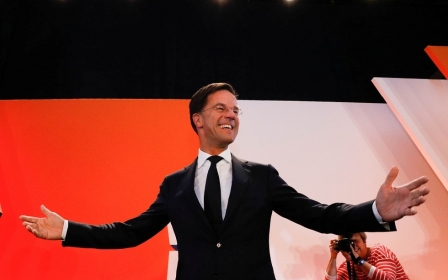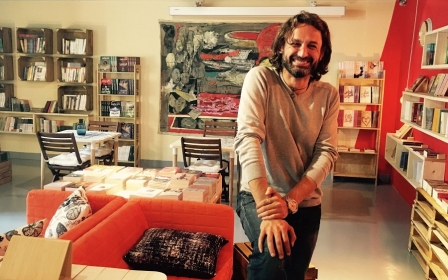Dutch jail becomes hub for refugees and locals 'building community together'
AMSTERDAM - In the days when it was a prison, Amsterdam's Bilmerbajes must have been an unpleasant place to pass by, with its looming grey towers and fortress-like moat, to say nothing of life inside. These days, however, the place buzzes with positive energy.
Many of the walls are covered in colourful murals, the old laundry room has been turned into a trendy restaurant and the former solitary confinement rooms have been repurposed as a hammam.
This is Lola Lik - a cultural hub for all sorts of businesses, projects and initiatives - but with a twist.
All ideas must incorporate refugees from the neighbouring asylum centre or surrounding areas in some way, whether by providing jobs, free skills training or recreational activities.
The aim is to better ease newcomers into life in the Dutch capital, just one of a number of creative approaches to the complex issue of integration being supported by the City of Amsterdam.
Sari Ekminas, 31, fled the war in Syria just over two years ago. Back there, he was a journalist, but here he has had to start over from scratch.
He spent the first seven months moving between camps in the Netherlands before being granted a five-year visa and assigned a home in a small town in the province of North Holland.
He arrived at Lola Lik a year ago with a friend knowing no one and nothing about the project; today he works there as an event coordinator.
"I spent a lot of energy on this place," he tells Middle East Eye with a smile.
"Almost everyone in this team is Dutch, I'm the only Syrian who got a job here. I prefer this form of integration through work rather than activities or games. My network is getting much bigger, now I know hundreds of people here."
Lola stands for (Stichting) Leegstand OpLossers Amsterdam, roughly: the Foundation for Solutions to Vacant Properties in Amsterdam, and "lik" is Amsterdam slang for a prison but also means "a lick of paint".
Finding a network
Providing professional and social connections for so-called "status-holders" are two of the three pillars of Lola Lik's vision, explains communications director Maria Gomez.
"The idea behind it is that the most important thing refugees are missing when they come here is a network," she says. "It's super hard to find a house or job here without one, because so much is done via word of mouth.
"The third pillar is reframing refugees to focus on people's similarities instead of their differences as often depicted in the media," says Gomez.
"We want to show the future."
The most important thing refugees are missing when they come here is a network
- Maria Gomez, communications director at Lola Lik
Lola Lik is now frequented by hundreds of refugees every day and is home to 85 different organisations and counting, including a restaurant, several language schools, a hammam, marketing startups, architects, a boxing gym, a tart shop, a hairdresser, music producers, catering companies, lawyers, and many others. Ten of them are run by entrepreneurial refugees, the rest by locals.
"Instead of a more top-down approach of the government, we try to be complementary with a more bottom-up approach. We empower them and give them more learning opportunities," explains Gomez.
One example is Make It Here, a free eight-week intensive course in online marketing and personal development run by three Dutch entrepreneurs.
"The Dutch working culture is very different for newcomers," explains one of the founders, Nick Aldewereld.
"So we give newcomers the skills to fully integrate into the Dutch job market. We teach them how to build their resume, how to use LinkedIn, how to deal with real-life scenarios."
Successful participants end up certified for Google Analytics, AdWords and Facebook Blueprint - key industry qualifications.
The Refugee Company believes that to really integrate is to find work, and that's hard without experience
- Michel Youssef, Syrian hospitality manager
Elsewhere in the hub, Michel Youssef, a 30-year-old from Syria, is organising the team at A Beautiful Mess, a lively lunch restaurant with a multicultural menu run by The Refugee Company in the prison's former laundry room.
"The Refugee Company believes that to really integrate is to find work, and that's hard without experience," says hospitality manager Youssef.
"So they create their own projects and allow refugees to build up their experience."
Alongside the restaurant there's also a coffee bar and an atelier selling handmade clothes, all aimed at generating jobs and training opportunities for refugees alongside experienced Dutch professionals.
Integration on the road to citizenship
This exemplifies the City of Amsterdam's new integration policy, which emphasises the importance of refugees quickly getting a job or an education during the three-year citizenship education course rather than after it.
This change came in last year when the municipality found that after several years, 65 percent of status-holders were still unemployed, far from ideal for anyone.
"The municipality of Amsterdam invests a lot in the support towards work, education and participation, which is a key factor for successful integration of refugees," a spokesperson for the municipality told Middle East Eye by email.
"Also, refugees contribute ... with their work, their talent and their drive to succeed in this country and the city of Amsterdam."
But integration is not just about finding work, it's also about learning the habits, customs and values of a country. In reality, this is best done not in the classroom, but by actually living and socialising with locals, something Startblok Riekerhaven is tackling head on.
In a wide street between several squats, white housing blocks on the western outskirts of Amsterdam, a group of Eritrean women fuss over each other's glamorous wedding outfits.
A Dutch girl with pink hair, waist-high fishnets and low-slung jeans walks past them to her bike. From the surrounding windows, Arabic music drifts onto the air, mingled with snatches of a phone conversation in broken English.
This radical experiment, the first of its kind in the Netherlands and possibly in Europe, has thrown together 280 young Dutch people with 280 young refugees into a student halls-like environment where they must manage everything themselves.
Integration means 'even people who don't understand each other can find common ground. It's not a complete solution for integration but it can support it'
- Fleur Eymann, Startblok Riekerhaven spokesperson
Each person gets their own, tiny room, but is encouraged to make friends with their neighbours and attend activities put on by residents, such as football games and Game of Thrones viewing nights.
"We're building a community together," explains Fleur Eymann, head of social content, communication and PR for the project.
"That's the crucial thing for integrating well. It means that even people who don't understand each other can find common ground. It's not a complete solution for integration but it can support it."
Challenges involved
One of the regular events put on is "What about...?" evenings, a chance for locals and newcomers to explore each other's cultures. Adrian, a 22-year-old refugee who fled Jamaica due to his sexuality, recently ran one talking about his home country at a neighbourhood festival, while the night before there was one about Syria.
"We're always trying new ways to get people together," says Adrian, who is studying communication systems.
"At first everyone was afraid to talk to each other ... and the Syrians, Jamaicans, Eritreans and so on just stuck together. That's why the activities are important, they force us to intermingle.
"We also get lots of contact with Dutch residents, which is great for learning the language."
All of those involved are honest about the challenges involved in such a bold project. Only about half the community attend the activities, with the other half too shy, not interested or too busy.
Cultural misunderstandings are rare but do happen, for example during Ramadan when some Muslim residents played football at 1am while others were trying to sleep, one resident recounted.
Language barriers, particularly for the Eritrean community - which makes up a third of the refugees living there - mean that communication is not always easy. And, as with any shared accommodation, differing cleaning habits can cause frustration.
"But in general it works," says Dutch resident Leoni Nyland, a 26-year-old journalism student.
"I really like it here, it's a nice, cheap place to live with lots of different people.
"Refugees are always on the news so it's really good to be able to talk to these people in real life," she adds.
Efforts to counter hostility
Nyland says she came with big ideas about helping everyone, but that in reality her studies and work obligations meant that was impossible.
Instead, she focuses on her Sudanese neighbour, translating letters from the municipality and answering logistical questions - the kind of invaluable help that can mean the difference between sinking or swimming in a new city.
"Startblok Riekerhaven is a good example of peer-education on living [and] exploring Amsterdam and the Netherlands," said a spokesperson for the municipality. "For the refugees, this project is a 'fast lane into Amsterdam'."
Such integration initiatives are especially important given the often hostile discourse surrounding refugees at the moment in Europe.
In the Netherlands, for example, the anti-immigrant sentiments of far-right politician Geert Wilders won him 13 percent of votes during divisive parliamentary elections earlier this year, a sign that not everyone in the country is on the same page.
In Amsterdam, however, the goal seems by and large to bring down the walls between communities.
"These initiatives are about meeting each other," the spokesperson added.
"When locals and refugees start talking with each other, face to face, it will increase understanding of each other and each other's point of view."
Middle East Eye propose une couverture et une analyse indépendantes et incomparables du Moyen-Orient, de l’Afrique du Nord et d’autres régions du monde. Pour en savoir plus sur la reprise de ce contenu et les frais qui s’appliquent, veuillez remplir ce formulaire [en anglais]. Pour en savoir plus sur MEE, cliquez ici [en anglais].


